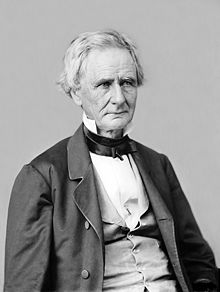Simon Cameron
| Simon Cameron | |
|---|---|
 |
|
| 26th United States Secretary of War | |
|
In office March 5, 1861 – January 14, 1862 |
|
| President | Abraham Lincoln |
| Preceded by | Joseph Holt |
| Succeeded by | Edwin M. Stanton |
|
United States Senator from Pennsylvania |
|
|
In office March 13, 1845 – March 3, 1849 |
|
| Preceded by | James Buchanan |
| Succeeded by | James Cooper |
|
In office March 4, 1857 – March 4, 1861 |
|
| Preceded by | Richard Brodhead |
| Succeeded by | David Wilmot |
|
In office March 4, 1867 – March 12, 1877 |
|
| Preceded by | Edgar Cowan |
| Succeeded by | J. Donald Cameron |
| Personal details | |
| Born |
March 8, 1799 Maytown, Pennsylvania, U.S. |
| Died | June 26, 1889 (aged 90) Maytown, Pennsylvania, U.S. |
| Political party | Whig, Democratic, Republican |
| Spouse(s) | Margaret Brua Cameron |
| Profession | Politician, Journalist, Editor |
| Signature | |
Simon Cameron (March 8, 1799 – June 26, 1889) was an American politician who served as United States Secretary of War for Abraham Lincoln at the start of the American Civil War.
Cameron made his fortune in railways, canals and banking, and founded the Bank of Middletown. He then turned to a life of politics. He became a U.S. senator in 1845 for the state of Pennsylvania, succeeding James Buchanan. Originally a Democrat, he failed to secure a nomination for senator from the Know-Nothing party, and joined the People's Party, the Pennsylvania branch of what became the Republican Party. He won the Senate seat in 1857, and became one of the candidates for the Republican nomination in the presidential election of 1860.
Cameron gave his support to Abraham Lincoln, and became his Secretary of War. He served only a year before resigning amidst allegations of disorganization and corruption during the early phases of the American Civil War. Cameron then became the minister to Russia, but was overseas for less than a year.
Beginning in 1867, he again served in the Senate; he was succeeded by his son, J. Donald Cameron in 1877, and only resigned upon confirmation that his son would succeed him.
After leaving the senate, Cameron lived in retirement, but still participated in politics and tended to his many business interests. He died in 1889 and was buried in Harrisburg.
Cameron's chief legacy was a powerful Republican party machine that continued to dominate Pennsylvania politics long after his death.
...
Wikipedia
